- Home
- E. M. Forster
The Longest Journey Page 7
The Longest Journey Read online
Page 7
“We are not leaving Sawston,” she wrote. “I saw how selfish it was of me to risk spoiling Herbert’s career. I shall get used to any place. Now that he is gone, nothing of that sort can matter. Every one has been most kind, but you have comforted me most, though you did not mean to. I cannot think how you did it, or understood so much. I still think of you as a little boy with a lame leg,—I know you will let me say this,—and yet when it came to the point you knew more than people who have been all their lives with sorrow and death.”
Rickie burnt this letter, which he ought not to have done, for it was one of the few tributes Miss Pembroke ever paid to imagination. But he felt that it did not belong to him: words so sincere should be for Gerald alone. The smoke rushed up the chimney, and he indulged in a vision. He saw it reach the outer air and beat against the low ceiling of clouds. The clouds were too strong for it; but in them was one chink, revealing one star, and through this the smoke escaped into the light of stars innumerable. Then—but then the vision failed, and the voice of science whispered that all smoke remains on earth in the form of smuts, and is troublesome to Mrs. Aberdeen.
“I am jolly unpractical,” he mused. “And what is the point of it when real things are so wonderful? Who wants visions in a world that has Agnes and Gerald?” He turned on the electric light and pulled open the table-drawer. There, among spoons and corks and string, he found a fragment of a little story that he had tried to write last term. It was called “The Bay of the Fifteen Islets,” and the action took place on St. John’s Eve off the coast of Sicily. A party of tourists land on one of the islands. Suddenly the boatmen become uneasy, and say that the island is not generally there. It is an extra one, and they had better have tea on one of the ordinaries. “Pooh, volcanic!” says the leading tourist, and the ladies say how interesting. The island begins to rock, and so do the minds of its visitors. They start and quarrel and jabber. Fingers burst up through the sand—black fingers of sea devils. The island tilts. The tourists go mad. But just before the catastrophe one man, integer vitæ scelerisque purus, sees the truth. Here are no devils. Other muscles, other minds, are pulling the island to its subterranean home. Through the advancing wall of waters he sees no grisly faces, no ghastly medieval limbs, but—– But what nonsense! When real things are so wonderful, what is the point of pretending?
And so Rickie deflected his enthusiasms. Hitherto they had played on gods and heroes, on the infinite and the impossible, on virtue and beauty and strength. Now, with a steadier radiance, they transfigured a man who was dead and a woman who was still alive.
7
Love, say orderly people, can be fallen into by two methods: (1) through the desires, (2) through the imagination. And if the orderly people are English, they add that (1) is the inferior method, and characteristic of the South. It is inferior. Yet those who pursue it at all events know what they want; they are not puzzling to themselves or ludicrous to others; they do not take the wings of the morning and fly into the uttermost parts of the sea before walking to the registry office; they cannot breed a tragedy quite like Rickie’s.
He is, of course, absurdly young—not twenty-one—and he will be engaged to be married at twenty-three. He has no knowledge of the world; for example, he thinks that if you do not want money you can give it to friends who do. He believes in humanity because he knows a dozen decent people. He believes in women because he has loved his mother. And his friends are as young and as ignorant as himself. They are full of the wine of life. But they have not tasted the cup—let us call it the teacup—of experience, which has made men of Mr. Pembroke’s type what they are. Oh, that teacup! To be taken at prayers, at friendship, at love, till we are quite sane, efficient, quite experienced, and quite useless to God or man. We must drink it, or we shall die. But we need not drink it always. Here is our problem and our salvation. There comes a moment—God knows when—at which we can say, “I will experience no longer. I will create. I will be an experience.” But to do this we must be both acute and heroic. For it is not easy, after accepting six cups of tea, to throw the seventh in the face of the hostess. And to Rickie this moment has not, as yet, been offered.
Ansell, at the end of his third year, got a first in the Moral Science Tripos. Being a scholar, he kept his rooms in college, and at once began to work for a Fellowship. Rickie got a creditable second in the Classical Tripos, Part I., and retired to sallow lodgings in Mill Lane, carrying with him the degree of B.A. and a small exhibition, which was quite as much as he deserved. For Part II. he read Greek Archaeology, and got a second. All this means that Ansell was much cleverer than Rickie. As for the cow, she was still going strong, though turning a little academic as the years passed over her.
“We are bound to get narrow,” sighed Rickie. He and his friend were lying in a meadow during their last summer term. In his incurable love for flowers he had plaited two garlands of buttercups and cow-parsley, and Ansell’s lean Jewish face was framed in one of them. “Cambridge is wonderful, but—but it’s so tiny. You have no idea—at least, I think you have no idea—how the great world looks down on it.”
“I read the letters in the papers.”
“It’s a bad look-out.”
“How?”
“Cambridge has lost touch with the times.”
“Was she ever intended to touch them?”
“She satisfies,” said Rickie mysteriously, “neither the professions, nor the public schools, nor the great thinking mass of men and women. There is a general feeling that her day is over, and naturally one feels pretty sick.”
“Do you still write short stories?”
“Why?”
“Because your English has gone to the devil. You think and talk in Journalese. Define a great thinking mass.”
Rickie sat up and adjusted his floral crown.
“Estimate the worth of a general feeling.”
Silence.
“And thirdly, where is the great world?”
“Oh that—–!”
“Yes. That,” exclaimed Ansell, rising from his couch in violent excitement. “Where is it? How do you set about finding it? How long does it take to get there? What does it think? What does it do? What does it want? Oblige me with specimens of its art and literature.” Silence. “Till you do, my opinions will be as follows: There is no great world at all, only a little earth, for ever isolated from the rest of the little solar system. The earth is full of tiny societies, and Cambridge is one of them. All the societies are narrow, but some are good and some are bad—just as one house is beautiful inside and another ugly. Observe the metaphor of the houses: I am coming back to it. The good societies say, ‘I tell you to do this because I am Cambridge.’ The bad ones say, ‘I tell you to do that because I am the great world,’—not because I am ‘Peckham,’ or ‘Billingsgate,’ or ‘Park Lane,’ but ‘because I am the great world.’ They lie. And fools like you listen to them, and believe that they are a thing which does not exist and never has existed, and confuse ‘great,’ which has no meaning whatever, with ‘good,’ which means salvation. Look at this great wreath: it’ll be dead tomorrow. Look at that good flower: it’ll come up again next year. Now for the other metaphor. To compare the world to Cambridge is like comparing the outsides of houses with the inside of a house. No intellectual effort is needed, no moral result is attained. You only have to say, ‘Oh, what a difference!’ and then come indoors again and exhibit your broadened mind.”
“I never shall come indoors again,” said Rickie. “That’s the whole point.” And his voice began to quiver. “It’s well enough for those who’ll get a Fellowship, but in a few weeks I shall go down. In a few years it’ll be as if I’ve never been up. It matters very much to me what the world is like. I can’t answer your questions about it; and that’s no loss to you, but so much the worse for me. And then you’ve got a house—not a metaphorical one, but a house with father and sisters. I haven’t, and never shall have. There’ll never again be a home for me like Cambridge. I shall only l
ook at the outside of homes. According to your metaphor, I shall live in the street, and it matters very much to me what I find there.”
“You’ll live in another house right enough,” said Ansell, rather uneasily. “Only take care you pick out a decent one. I can’t think why you flop about so helplessly, like a bit of seaweed. In four years you’ve taken as much root as any one.”
“Where?”
“I should say you’ve been fortunate in your friends.”
“Oh—that!” But he was not cynical—or cynical in a very tender way. He was thinking of the irony of friendship—so strong it is, and so fragile. We fly together, like straws in an eddy, to part in the open stream. Nature has no use for us: she has cut her stuff differently. Dutiful sons, loving husbands, responsible fathers—these are what she wants, and if we are friends it must be in our spare time. Abram and Sarai were sorrowful, yet their seed became as sand of the sea, and distracts the politics of Europe at this moment. But a few verses of poetry is all that survives of David and Jonathan.
“I wish we were labelled,” said Rickie. He wished that all the confidence and mutual knowledge that is born in such a place as Cambridge could be organized. People went down into the world saying, “We know and like each other; we shan’t forget.” But they did forget, for man is so made that he cannot remember long without a symbol; he wished there was a society, a kind of friendship office, where the marriage of true minds could be registered.
“Why labels?”
“To know each other again.”
“I have taught you pessimism splendidly.” He looked at his watch.
“What time?”
“Not twelve.”
Rickie got up.
“Why go?” He stretched out his hand and caught hold of Rickie’s ankle.
“I’ve got that Miss Pembroke to lunch—that girl whom you say never’s there.”
“Then why go? All this week you have pretended Miss Pembroke awaited you. Wednesday—Miss Pembroke to lunch. Thursday—Miss Pembroke to tea. Now again—and you didn’t even invite her.”
“To Cambridge, no. But the Hall man they’re stopping with has so many engagements that she and her friend can often come to me, I’m glad to say. I don’t think I ever told you much, but over two years ago the man she was going to marry was killed at football. She nearly died of grief. This visit to Cambridge is almost the first amusement she has felt up to taking. Oh, they go back tomorrow! Give me breakfast tomorrow.”
“All right.”
“But I shall see you this evening. I shall be round at your paper on Schopenhauer. Lemme go.”
“Don’t go,” he said idly. “It’s much better for you to talk to me.”
“Lemme go, Stewart.”
“It’s amusing that you’re so feeble. You—simply—can’t—get—away. I wish I wanted to bully you.”
Rickie laughed, and suddenly overbalanced into the grass. Ansell, with unusual playfulness, held him prisoner. They lay there for a few minutes, talking and ragging aimlessly. Then Rickie seized his opportunity and jerked away.
“Go, go!” yawned the other. But he was a little vexed, for he was a young man with great capacity for pleasure, and it pleased him that morning to be with his friend. The thought of two ladies waiting lunch did not deter him; stupid women, why shouldn’t they wait? Why should they interfere with their betters? With his ear on the ground he listened to Rickie’s departing steps, and thought, “He wastes a lot of time keeping engagements. Why will he be pleasant to fools?” And then he thought, “Why has he turned so unhappy? It isn’t as if he’s a philosopher, or tries to solve the riddle of existence. And he’s got money of his own.” Thus thinking, he fell asleep.
Meanwhile Rickie hurried away from him, and slackened and stopped, and hurried again. He was due at the Union in ten minutes, but he could not bring himself there. He dared not meet Miss Pembroke: he loved her.
The devil must have planned it. They had started so gloriously; she had been a goddess both in joy and sorrow. She was a goddess still. But he had dethroned the god whom once he had glorified equally. Slowly, slowly, the image of Gerald had faded. That was the first step. Rickie had thought, “No matter. He will be bright again. Just now all the radiance chances to be in her.” And on her he had fixed his eyes. He thought of her awake. He entertained her willingly in dreams. He found her in poetry and music and in the sunset. She made him kind and strong. She made him clever. Through her he kept Cambridge in its proper place, and lived as a citizen of the great world. But one night he dreamt that she lay in his arms. This displeased him. He determined to think a little about Gerald instead. Then the fabric collapsed.
It was hard on Rickie thus to meet the devil. He did not deserve it, for he was comparatively civilized, and knew that there was nothing shameful in love. But to love this woman! If only it had been any one else! Love in return—that he could expect from no one, being too ugly and too unattractive. But the love he offered would not then have been vile. The insult to Miss Pembroke, who was consecrated, and whom he had consecrated, who could still see Gerald, and always would see him, shining on his everlasting throne—this was the crime from the devil, the crime that no penance would ever purge. She knew nothing. She never would know. But the crime was registered in heaven.
He had been tempted to confide in Ansell. But to what purpose? He would say, “I love Miss Pembroke,” and Stewart would reply, “You ass.” And then, “I’m never going to tell her.” “You ass,” again. After all, it was not a practical question; Agnes would never hear of his fall. If his friend had been, as he expressed it, “labelled”; if he had been a father, or still better a brother, one might tell him of the discreditable passion. But why irritate him for no reason? Thinking “I am always angling for sympathy; I must stop myself,” he hurried onward to the Union.
He found his guests half way up the stairs, reading the advertisements of coaches for the Long Vacation. He heard Mrs. Lewin say, “I wonder what he’ll end by doing.” A little overacting his part, he apologized nonchalantly for his lateness.
“It’s always the same,” cried Agnes. “Last time he forgot I was coming altogether.” She wore a flowered muslin—something indescribably liquid and cool. It reminded him a little of those swift piercing streams, neither blue nor green, that gush out of the Dolomites. Her face was clear and brown, like the face of a mountaineer; her hair was so plentiful that it seemed banked up above it; and her little toque, though it answered the note of the dress, was almost ludicrous, poised on so much natural glory. When she moved, the sunlight flashed on her earrings.
He led them up to the luncheon-room. By now he was conscious of his limitations as a host, and never attempted to entertain ladies in his lodgings. Moreover, the Union seemed less intimate. It had a faint flavour of a London club; it marked the undergraduate’s nearest approach to the great world. Amid its waiters and serviettes one felt impersonal, and able to conceal the private emotions. Rickie felt that if Miss Pembroke knew one thing about him, she knew everything. During this visit he took her to no place that he greatly loved.
“Sit down, ladies. Fall to. I’m sorry. I was out towards Coton with a dreadful friend.”
Mrs. Lewin pushed up her veil. She was a typical May-term chaperon, always pleasant, always hungry, and always tired. Year after year she came up to Cambridge in a tight silk dress, and year after year she nearly died of it. Her feet hurt, her limbs were cramped in a canoe, black spots danced before her eyes from eating too much mayonnaise. But still she came, if not as a mother as an aunt, if not as an aunt as a friend. Still she ascended the roof of King’s, still she counted the balls of Clare, still she was on the point of grasping the organization of the May races. “And who is your friend?” she asked.
“His name is Ansell.”
“Well, now, did I see him two years ago—as a bedmaker in something they did at the Foot Lights? Oh, how I roared.”
“You didn’t see Mr. Ansell at the Foot Lights,” said Agnes, smi
ling.
“How do you know?” asked Rickie.
“He’d scarcely be so frivolous.”
“Do you remember seeing him?”
“For a moment.”
What a memory she had! And how splendidly during that moment she had behaved!
“Isn’t he marvellously clever?”
“I believe so.”
“Oh, give me clever people!” cried Mrs. Lewin. “They are kindness itself at the Hall, but I assure you I am depressed at times. One cannot talk bump-rowing for ever.”
“I never hear about him, Rickie; but isn’t he really your greatest friend?”
“I don’t go in for greatest friends.”
“Do you mean you like us all equally?”
“All differently, those of you I like.”
“Ah, you’ve caught it!” cried Mrs. Lewin. “Mr. Elliot gave it you there well.”
Agnes laughed, and, her elbows on the table, regarded them both through her fingers—a habit of hers. Then she said, “Can’t we see the great Mr. Ansell?”
“Oh, let’s. Or would he frighten me?”
“He would frighten you,” said Rickie. “He’s a trifle weird.”
“My good Rickie, if you knew the deathly dullness of Sawston—every one saying the proper thing at the proper time, I so proper, Herbert so proper! Why, weirdness is the one thing I long for! Do arrange something.”
“I’m afraid there’s no opportunity. Ansell goes some vast bicycle ride this afternoon; this evening you’re tied up at the Hall; and tomorrow you go.”
“But there’s breakfast tomorrow,” said Agnes. “Look here, Rickie, bring Mr. Ansell to breakfast with us at Buol’s.”

 The Celestial Omnibus and Other Stories
The Celestial Omnibus and Other Stories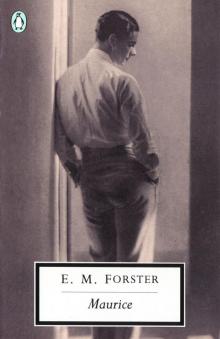 Maurice
Maurice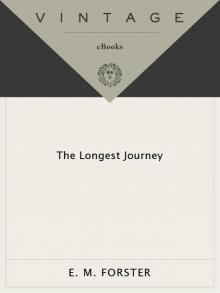 The Longest Journey
The Longest Journey Howards End
Howards End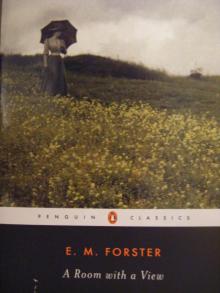 A Room with a View
A Room with a View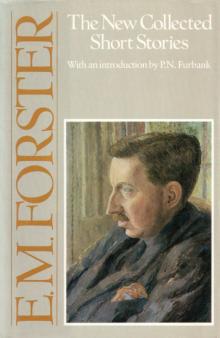 The New Collected Short Stories
The New Collected Short Stories A Passage to India
A Passage to India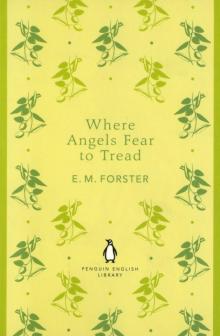 Where Angels Fear to Tread
Where Angels Fear to Tread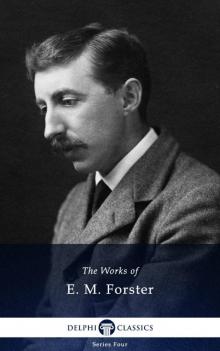 Works of E M Forster
Works of E M Forster Selected Stories
Selected Stories The Machine Stops
The Machine Stops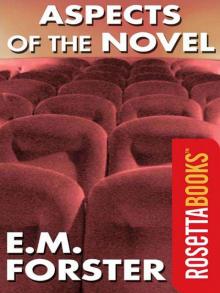 Aspects of the Novel
Aspects of the Novel